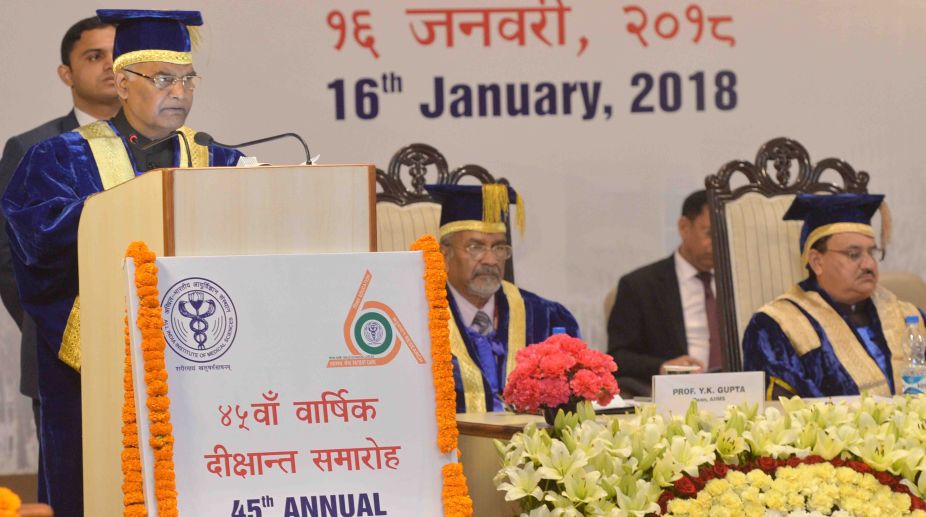Dr Jitendra Singh inaugurates Centre for Advanced Genomics & Precision Medicine at AIIMS Jammu
Union Minister Dr Jitendra Singh on Sunday inaugurated the Centre for Advanced Genomics & Precision Medicine at the AIIMS Jammu.

President of India, Ram Nath Kovind, attending the 45th Institute Annual Convocation of the All India Institute of Medical Sciences (AIIMS) at AIIMS,in the capitalol on Tuesday------------SNS--------------16-01-18
Pointing out the shortage of doctors in the country, President Ram Nath Kovind on Tuesday said a new regulatory system was the need of hour to enhance availability of doctors and medical professionals in society.
Addressing the 45th convocation of the All India Institute of Medical Sciences (AIIMS), he noted that doctors needed help in form of more colleagues. “And this is where we need a new regulatory system to enhance availability of doctors and medical professionals in our society. In the absence of this, the workload on our doctors is very high,” added Kovind.
Advertisement
He also expressed serious concern over “highly inadequate” medical seats existing in the country. Kovind noted that medical colleges, run by both government and private institutions, had about 67,000 undergraduate seats and 31,000 post-graduate seats currently. and said, “In a country of 1.3 billion people, this is highly inadequate,” he claimed.
Advertisement
The country has to overcome these “regulatory bottlenecks” and “interest groups” that have prevented the growth of quality medical education in our country, the President said.
“This gives us far fewer medical graduates and post-graduates every year than our people need. It also leads to aspiring medical students seeking admission in colleges in other countries, simply because they have limited options at home,” he said and added that such a situation was “simply not acceptable”.
“We need to address this situation very urgently. We need to create more opportunities for those young people who want to make medicine their calling,” Kovind added.
Advising the graduating doctors to give back to the society, the President said doctors need to be legitimately rewarded for their academic excellence, their medical skills and their expertise.
“Yet, as doctors, their services must be available both to those who can afford their fees and also to those who are less fortunate and cannot. A disease does not distinguish between rich and poor but unfortunately the poor suffer the most. It is for society to profit from medical science ~ it is not for medical science to profiteer from society,” said Kovind.
Kovind expressed some other concerns related to immunisation campaigns for children. “Despite the progress we have made, gaps remain. For example, Indian companies are among the world’s biggest manufacturers of vaccines. These vaccines are supplied across the globe. “Our innovative medical scientists have even developed new vaccines. Even so, our own immunisation record remains below the desirable levels,” he observed.
Many children particularly in the far-flung and difficult-to-access areas did not get the full course of immunisation, the President added.
Advertisement